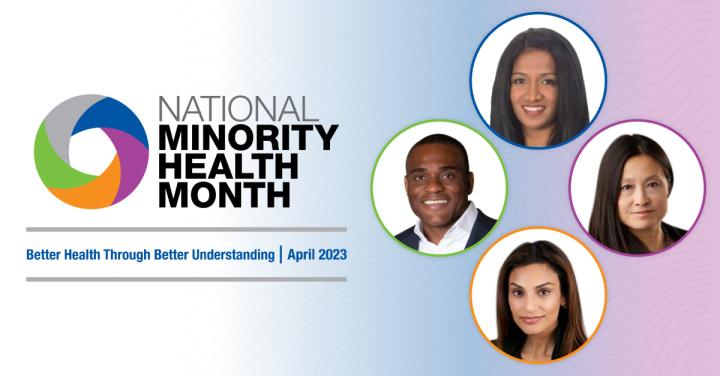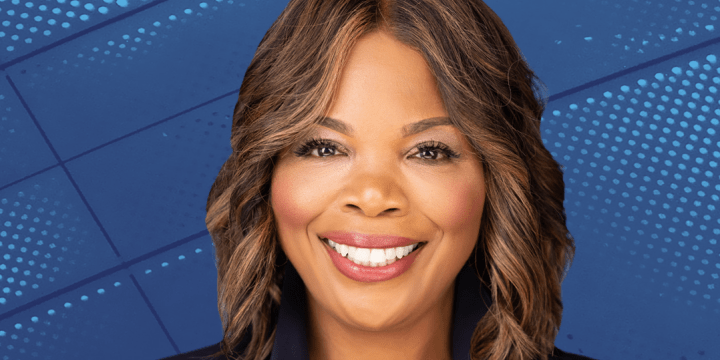Representation matters, and it especially matters in healthcare. To effectively treat all people, it’s imperative that we see ourselves reflected in the leaders who help create the healthcare systems embedded in our communities.
The lack of representation that’s been the norm for decades has led to significant disparities within the healthcare system that are important to note throughout the year, but especially during National Minority Health Month.
While many individuals face barriers to accessing quality care, minority communities are often disproportionately impacted. Nonmedical factors, known as social determinants of health, like economic stability, education access, social context and healthcare access have led to poorer health outcomes for people of color and make it more likely that they will get sick or have a lower life expectancy.
According to the CDC, African Americans are 60% more likely to have diabetes than white Americans, and their mortality rate is three times higher than that of their white counterparts. Hispanic and Latino Americans face a 9% higher risk of being diagnosed with diabetes, and Asian Americans, Native Hawaiians and Pacific Islanders are at two times the risk. Furthermore, Black or African Americans, Hispanic, Latino, Asian and Native American adults are more likely to be hospitalized or die from COVID-19.
Outside of social determinants of health, another major factor contributing to health disparities is the lack of diversity in clinical trials. Historically, white patients have predominately participated in clinical trials, meaning the efficacy and safety of new treatments and medications may not be fully understood for minority populations. According to a recent report from the FDA, only 8% of clinical trial participants in 2020 were African American. Hispanic and Asian participants were slightly better represented, but still only made up 11% and 6% of trial participants, respectively.
Leaders at Walgreens are taking major steps to begin to address these disparities and promote health equity. In 2021, WBA created U.S. Healthcare, a new business segment aimed at reimagining local healthcare by meeting customers where they are on their personal healthcare journeys. Through offering data-enabled solutions, diverse clinical trial offerings and community-based services, the new venture aims to empower all individuals to live more joyful lives through better health.
Get to know the leaders making a meaningful impact on the lives of all communities by implanting the strategies and goals of U.S. Healthcare.
Anita Allemand, chief transformation and integration officer, U.S. Healthcare
 Can you tell us about your role?
Can you tell us about your role?
My job has two components. One is to identify new opportunities to advance our healthcare strategy. We want to make Walgreens the partner of choice for expanding care delivery. So one of my remits is to identify where there are gaps and what we need to fill those gaps, whether it’s building on our existing business or making new partnerships or acquisitions. The second component of my job, integration, is to pull together and maximizethe investments we've made outside the organization. Examples of that are CareCentrix, Shields and VillageMD, and considering how we bring primary care, post-acute and home services, and specialty pharmacies together for our customers as an integrated health solutions provider.
What excites you most about being a part of the U.S. Healthcare team?
It has the energy and passion of a startup while being able to execute at scale. I believe in the strength of the Walgreens brand and our focus on the patient and consumer. We have a significant opportunity to win in this space by remaining an unbiased partner to all. We truly have the patient’s and the consumer's best interests in mind. It’s exciting to advance our collaborations with best in class organization to make an impact on communities by continuously expanding the care we can deliver to millions of Americans.
This year’s theme for National Minority Health Month is “Better Health Through Better Understanding.” What does that phrase mean to you in relation to your role at WBA?
That theme is really true to my role. If you think about women in this country, we make 80% of the healthcare decisions for ourselves and our family units. So I think about women as being the CEO, CFO, CMO and COO of a family and consider if they are being reached and engaged. And then there are the issues around racial diversity in healthcare, and I think its critically important to ensure we are developing inclusive healthcare solutions and promoting representation of minority women at all levels in our organization especially at the executive levels.
Ramita Tandon, chief clinical trials officer, U.S. Healthcare
 Can you tell us about your role?
Can you tell us about your role?
I joined U.S. Healthcare in 2021 as the chief clinical trials officer with the vision to reimagine how we conduct clinical trials within local communities across the U.S. I've spent about 25 years in this space. I've seen the good, bad and ugly of how clinical trials have been conducted. When I joined the company, it was about the art of the possible. I'm here to transform how we conduct clinical trials by using the Walgreens footprint, brand, trust—all of it—to tackle the core issues around access, convenience, equity and diversity. Our patient-centric clinical trial research business will allow us to serve as an entry point for patients who've never heard about clinical trials or never been invited to participate in one to come to a local Walgreens pharmacy and start to understand how clinical trials can help improve their quality of life.
What excites you most about being a part of the healthcare team?
For so long, stakeholders like hospital healthcare systems or insurance companies have said they need to make changes, but never really mentioned the people. What do people really want? The answer to that question is simple. Most people just want to be healthy and live their lives. So from my perspective, the product that people or patients want is health without having to think too much about coordination or efforts to help improve their health. Walgreens is building out that healthcare continuum and clinical trials is part of that.
This year’s theme for National Minority Health Month is “Better Health Through Better Understanding.” What does that phrase mean to you in relation to your role at WBA?
I love it because from a clinical trials perspective, we're building a patient-centric clinical research enterprise that brings trials to all patients across the U.S. It’s not just focused on race and ethnicity; there are socioeconomic and gender factors as well. It should not be nuanced for patients who have insurance or are seeing their providers on a regular basis. Clinical trials should be accessible to everybody – education and understanding is key, so that people can proactively ask their providers or pharmacists if they can be involved based on their conditions.
Chidebelu Ufodike, chief of staff, U.S. Healthcare
 Can you tell us about your role?
Can you tell us about your role?
I provide strategic leadership and support to our healthcare division. I report to our president, John Driscoll, and work closely with our executive team to ensure that our healthcare business is aligned with our overall company vision of being the leading partner in reimagining local healthcare and wellbeing for all. And one of the things I do is work with the teams across the organization to develop and execute our strategic priorities and ensure we’re collaborating with other areas of the company to deliver on our brand promise.
What excites you about being a part of the healthcare team?
It’s super exciting to be a part of the next growth engine for our company and find the most creative ways to improve healthcare. I’ve always had a passion for helping others, which is why I went to pharmacy school. I looked patients in their eyes and know, firsthand, the effects that barriers to healthcare access can have on a person’s life.. I know what it means for a mom to show up at the pharmacy and not be able to get an inhaler for her 5-year-old child because she needs prior authorization and she has no clue what that means. So to be in my current position where I can influence how our providers and pharmacists practice, how they deliver care and break down barriers, in a meaningful matter, is extremely refreshing.
This year’s theme for National Minority Health Month is “Better Health Through Better Understanding.” What does that phrase mean to you in relation to your role at WBA?
This phrase suggests that improving our understanding of the health needs and experiences of minority groups can lead to better health outcomes for everyone. I still carry the names of some of my patients in my mind. I bring that to work every day so I can think through the decisions we make from their perspective and how it will truly impact our patients. Overall, the theme highlights the importance of education, awareness and action. I’m incredibly proud to work with the team at U.S. Healthcare because their actions touch people's lives.
Lisa Min Hu, vice president of healthcare and clinical analytics, U.S. Healthcare
 Can you tell us about your role?
Can you tell us about your role?
My role is to lead the healthcare data and analytics function within U.S. Healthcare. Some of my main focus areas are to stand up this new healthcare business and understand data at the broader healthcare level beyond just pharmacy. I work to analyze the value of our products and services and determine new sources of products and revenue. Data is the thread that connects all the dots across the programs.
What excites you most about being a part of the healthcare team?
If I think about where healthcare happens in the U.S., it happens at the provider’s office or the hospital. But it’s the pharmacy that we go to all the time. It’s a space that's underutilized and can be leveraged to help people manage their healthcare better. I was trying to make my daughter an appointment recently, and her doctor didn’t have an opening for over a month. But we have the opportunity, especially with VillageMD, to better serve not just underserved communities, but all communities with everyday health matters.
This year’s theme for National Minority Health Month is “Better Health Through Better Understanding.” What does that phrase mean to you in relation to your role at WBA?
Being fair and inclusive and having a representative point of view is critical to anyone's life and any company's success. We must represent everyone. If I think about Walgreens, we serve everybody in America. So it's critical our brand and the work we do represents that. If you think about the work we're doing right now with Health Corners or the clinical trials business, there’s this notion of serving the entire community, which is so important to me. And on a personal level, as an Asian American woman, I feel that as a race we need to be better represented.
It’s amazing to think that in almost all industries, in many ways, Asian Americans are still the “first” of some kind. Even in the year 2023, we are still trying to claw our way up, so to speak. So it’s critically important to me as a leader to think about the shadow I cast, the team I build and the importance of voicing racial identity. I know it's common for folks to say this, but I stand on many people's shoulders so somebody can stand on mine. So along the way, we can reach a little higher and support people to lift them up. That’s a valuable lesson I think about for my son and daughter.




